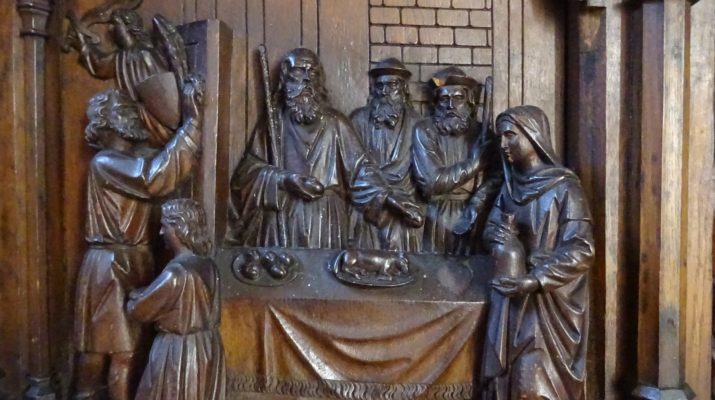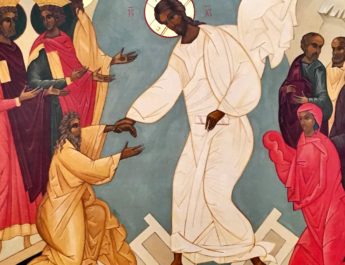Exodus 12:1-14
Maundy Thursday ABC
1 The LordI said to MosesII and AaronIII in the landIV of Egypt:V
I “Lord” = YHVH. From havah (to be, become) or hayah (to come to pass, become, be). This is the name of the God of Israel, the self-existent and eternal one, the tetragrammaton. This pronunciation has been lost to time so “Lord” is generally used in its place.
II “Moses” = Mosheh. From mashah (to pull out in a literal or figurative sense, to draw out) OR from Egyptian mes or mesu (child, son i.e. child of…). This is Moses – the one drawn out from the water, which is to say, rescued. If derived from the Egyptian, his name would share a root with Rameses and Thutmose.
III “Aaron” = Aharon. Derivation uncertain. May mean “bearer of martyrs” OR be related to Ancient Egyptian ꜥḥꜣ rw (warrior lion) OR elevated, exalted, high mountain. This is Aaron. See https://en.wiktionary.org/wiki/Aaron
IV “land” = erets. Root may mean to be firm. This is earth, ground, field land, or country.
V “Egypt” = Mitsrayim. Perhaps from matsor (besieged or fortified place, bulwark, entrenchment; something hemmed in; a siege or distress or fastness); from tsur (to confine, besiege, to cramp). This is Egypt.
2 This monthVI shall mark for you the beginningVII of months; it shall be the firstVIII month of the yearIX for you.
VI “month” = chodesh. From chadash (to renew, repair). This refers to a new moon. It can also mean monthly.
VII “beginning” = rosh. This may come a word that means to shake. It is the head, captain, or chief. It can also be excellent or the forefront. It can be first in position or in statue or in time (i.e. the beginning).
VIII “first” = rishon. Related to “beginning” in v2. From rishah (beginning or early time); from rosh (see note VII above). This is first, former, ancestor, beginning, ranked first.
IX “year” = shanah. From shana (to change, alter). This is a year, age, old. It can also mean yearly.
3 TellX the wholeXI congregationXII of IsraelXIII that on the tenthXIV of this month
X “tell” = dabar. This is generally to speak, answer, declare, or command. It might mean to arrange and so to speak in a figurative sense as arranging words.
XI “whole” = kol. From kalal (to complete). This is all or every.
XII “congregation” = edah. From yaad (to appoint, assemble or gather selves, agree) OR from ed (witness, testimony, recorder); from ud (to admonish, repeat, duplicate, testify, restore, record, relieve). This is a congregation, assembly, or company. It could be a family, crowd, or fixture.
XIII “Israel” = Yisrael. From sarah (to persist, exert oneself, contend, persevere, wrestle, prevail) + el (God or god). This is Israel, meaning God strives or one who strives with God; new name for Jacob and for his offspring. This refers to the people and to the land.
XIV “tenth” = asor. 16x in OT. From the same as eser (teen or -teen). This is ten or tenth. It can also be a ten-stringed instrument like the lute.
they are to takeXV a lambXVI for eachXVII family,XVIII a lamb for each household.XIX
XV “take” = laqach. This is to take, accept, carry away, receive. It can also have the sense of take a wife or take in marriage.
XVI “lamb” = seh. Perhaps from sha’ah (to make a loud noise or crash, devastate, rush). This is a lamb, sheep, or goat – a part of a flock.
XVII “each” = ish. Perhaps from enosh (human, humankind, mortal); from anash (to be weak, sick, or frail). This is man, husband, another, or humankind.
XVIII “family” = bayit + ab. Literally, “according to the house of his father.” Bayit is probably from banah (to build, make, set up, obtain children; to build literally or figuratively). This is house, court, family, palace, temple. Ab is This is father, chief, or ancestor. It is father in a literal or figurative sense.
XIX “household” = bayit. Same as “family” in v3. See note XVIII above.
4 If a household is too smallXX for a whole lamb, it shall joinXXI its closestXXII neighborXXIII, XXIV in obtaining one;
XX “is too small” = maat…hayah. Maat is diminished, decreased, reduced, insignificant. It is a broad sense of being small or becoming small. Figuratively, this can mean ineffective. Related to “Lord” in v1. See note I above.
XXI “join” = laqach. Same as “take” in v3. See note XV above.
XXII “closest” = qarob. From qarab (to come near, offer, make ready). This is near whether nearby, related, near in time, or allied.
XXIII “neighbor” = shaken. From shakan (to settle down in the sense of residing somewhere or staying there permanently; to abide or continue). This is resident or neighbor. It is related to mishkan, the Hebrew word for “tabernacle.”
XXIV {untranslated} = bayit. Same as “family” in v3. See note XVIII above.
the lamb shall be dividedXXV in proportionXXVI to the numberXXVII of peopleXXVIII who eatXXIX of it.
XXV “divided” = kasas. Related to “number” in v4. See note XXVII below.
XXVI “proportion” = peh. This is mouth in a literal or figurative sense. So, more literally, it can be beak or jaws. More figuratively, it refers to speech, commands, or promises.
XXVII “number” = miksah. 2x in OT. From mekes (tzx, computation); from kasas (to estimate, divide, calculate). This is a number or valuation.
XXVIII “people” = nephesh + ish. Nephesh is related to naphash (to refresh or be refreshed). This is soul, self, person, emotion. It is a breathing creature. Can also refer to appetites and desires. Ish is the same as “each” in v3. See note XVII above.
XXIX “eat” = okel. From akal (to eat, devour, burn up, or otherwise consume; eating in a literal or figurative sense). This is food, supply of provisions, the act of eating, or the time when one eats.
5 Your lamb shall beXXX without blemish,XXXI a year-oldXXXII male;XXXIII you may take it from the sheepXXXIV or from the goats.XXXV
XXX “be” = hayah. Same as “is too small” in v4. See note XX above.
XXXI “without blemish” = tamim. From tamam (to finish or accomplish; to make perfect, demonstrate that you are upright; consume; to complete in a literal or figurative sense). This is entire in a literal or figurative sense. So, it could be complete, full, intact, or without defect. Alternately, it could refer to being sound, having integrity, being sincere or perfect.
XXXII “old” = ben. From banah (to build or obtain children). This is son, age, child. It is son in a literal or figurative sense.
XXXIII “male” = zakar. From zakar (to remember, to mark something so that it can be recalled, to be mindful of, to mention). This is male. Properly, perhaps, it means one who is remembered, which is to say a male.
XXXIV “sheep” = kebes. Root may mean to dominate. This is a young male sheep – having just reached the age where it can butt other sheep.
XXXV “goats” = ez. Perhaps from azaz (to be strong in a literal or figurative sense, overcome, be impudent). This is a female goat, but can refer to male goats when plural.
6 You shall keepXXXVI it until the fourteenthXXXVII dayXXXVIII of this month; then the whole assembledXXXIX congregation of Israel shall slaughterXL it atXLI twilight.XLII
XXXVI “shall keep” = hayah + mishmeret. Hayah is the same as “too small” in v4. See note XX above. Mishmeret is from mishmar (jail, guard, watch, guard post); from shamar (to keep, watch, or preserve; to guard something or to protect it as a thorny hedge protects something). This is a guard or watch or guard post. It is used figuratively for obligation, duty, or observance, including religious observance.
XXXVII “fourteenth” = arba + asar. Arba is from raba (to make square or be four-sided). This is four. Asar is related to “tenth” in v3. From the same as eser (see note XIV above). This is ten, teen, or teenth.
XXXVIII “day” = yom. Root may mean being hot. This is the day in a literal or figurative sense. It can also mean birth, age, daylight, continually or other references to time.
XXXIX “assembled” = qahal. From qahal (assembly, congregation, multitude). This is to gather, convene, assemble like a congregation.
XL “slaughter” = shachat. This is to slaughter, slay, or beat. It can be slaying for a sacrifice or in a massacre.
XLI “at” = bayin. From bin (to discern, consider, attend to; distinguishing things in one’s mind or, more generally, to understand). This is among, between, interval.
XLII “twilight” = ereb. This is night or dusk.
7 They shall take some of the bloodXLIII and putXLIV it on the twoXLV doorpostsXLVI and the lintelXLVII of the housesXLVIII in which they eatXLIX it.
XLIII “blood” = dam. Perhaps from damam (to cease, be or become mute, silent, still, cut off, hold peace, be astonished, die). This is blood, bloodshed, bloodguilt, lifeblood, and death. It is used for people and animals. More often blood from a wound or the blood of the innocent. Used figuratively for violence or for wine. Closely tied to life and death.
XLIV “put” = natan. This is to give, put, set, offer. It is to give literally or figuratively.
XLV “two” = shenayim. From sheni (double, again, another, second); from shanah (to fold, repeat, double, alter, or disguise). This is two, both, second, couple.
XLVI “doorposts” = mezuzah. 19x in OT. From the same as ziz (moving things like animals, abundance). This is a door or gate post. In modern Judaism, a mezuzah adorns the doorpost of many Jewish homes in reference to Deuteronomy 6:9. See https://en.wiktionary.org/wiki/mezuzah
XLVII “lintel” = mashqoph. 3x in OT – all in Exodus 12. From the same as sheqeph (frame, window, framework); from shaqaph (to look down or look out; properly, looking by leaning out a window; peeping or gazing). This is a lintel.
XLVIII “houses” = bayit. Same as “family” in v3. See note XVIII above.
XLIX “eat” = akal. Related to “who eat” in v4. See note XXIX above.
8 They shall eat the lambL that same night;LI they shall eat it roasted over the fireLII with unleavened breadLIII and bitter herbs.LIV
L “lamb” = basar. From basar (being a messenger, publish, carry preach; properly, this is being fresh, rosy or cheerful as one bearing news). This is flesh, the body, fat, skin, self, nakedness, humankind, or kin. It can also refer to private parts.
LI “night” = layil. Properly, this refers to light twisting away. It is used for night or midnight. Figuratively, this can mean adversity.
LII “fire” = esh. This is fire, burning, flaming, hot. It is fire in a literal or figurative sense.
LIII “unleavened bread” = matstsah. From matsats (to drain out). This is unleavened bread – bread that is sweet rather than becoming sour with the flavor of yeast. Can also be used to refer to the festival of Passover, the staple food of which is commonly transliterate matzoh from this word.
LIV “bitter herbs” = maror. 3x in OT. From marar (to be bitter, enraged, weep, grieve; properly, to trickle; to become bitter in a literal or figurative sense); from marar (to be bitter, embittered, weep, troubled); from mar (bitterness literal or figurative). This is bitterness or a bitter thing. It is where Mara (Naomi’s new name) and Miriam and Mary come from.
9 Do not eat any of it rawLV or boiledLVI in water,LVII but roasted over the fire, with its head,LVIII legs,LIX and inner organs.LX
LV “raw” = na. 1x in OT. Perhaps from nu (to hinder, discourage, refuse, break, or disallow). This is tough or raw meat.
LVI “boiled” = bashel + bashal. Bashel is 2x in OT. From bashal (to boil up, roast, or bake; ripen, produce, or seethe). This is cooked or boiled. Bashal is the same as the previous root. See above.
LVII “water” = mayim. This is water, waters, or waterway in a general sense. Figuratively, it can also mean juice, urine, or semen.
LVIII “head” = rosh. Same as “beginning” in v2. See note VII above.
LIX “legs” = kera. 9x in OT. From kara (to bow, crouch, kneel down, subdue; to bend the knee in many senses). This is the leg, but only from the knee down to the ankle. It is used in the OT of people and of locusts.
LX “inner organs” = qereb. Related to “closest” in v4. Perhaps from qarab (see note XXII above). This is among, in the midst, before, the center It is the inward part, whether literal or figurative. It can also be used for the heart, the site of thoughts and feelings. This word is also used as a technical term for the entrails of the animals who are sacrificed.
10 You shall let none of it remainLXI until the morning;LXII anything that remains until the morning you shallLXIII burn.LXIV
LXI “let…remain” = yathar. This is to jut over, remain behind, preserve, to excel. It can be to leave or to be in abundance.
LXII “morning” = boqer. From baqar (to seek, plow, break forth, admire, care for). This refers to the break of day. So it is dawn, early, morning, or morrow.
LXIII {untranslated} = esh. Same as “fire” in v8. See note LII above.
LXIV “burn” = saraph. This is to burn or kindle. This is the root that “seraphim” comes from.
11 This is how you shall eat it: your loinsLXV girded,LXVI your sandalsLXVII on your feet,LXVIII
LXV “loins” = mothen. This is the waist, slender, or small of back. It can also refer to the loins when in plural.
LXVI “girded” = chagar. This is to gird, bind, or arm. Generally, it is using a belt to gather up one’s garment so that it’s easier to run or move quickly.
LXVII “sandals” = naal. From naal (properly to secure with a bar or cord; to lock, bolt, enclose; to secure with a cord i.e. to put on a sandal). This is the tongue of a sandal and, by extension, a sandal or shoe itself. Figuratively, this can refer to occupancy, unwillingness to marry, or something without value.
LXVIII “feet” = regel. This is foot, endurance, or journey. It is a foot as the means of walking and so it implies a step or a greater journey. It can be used euphemistically for private parts.
and your staffLXIX in your hand;LXX and you shall eat it hurriedly.LXXI It is the passoverLXXII of the Lord.
LXIX “staff” = maqqel. 18x in OT. This is a shoot with leaves growing from it or a staff. It could be a walking stick, a stick for guiding (e.g. sheep), a stick for striking like a war club, or a divining rod.
LXX “hand” = yad. This is hand, ability, power. Hand in a literal sense, but also what one can do or the means by which one does it.
LXXI “hurriedly” = chippazon. 3x in OT. From chaphaz (hurry or alarm; something that begins with a start so it can mean to hurry away or to panic, tremble, fear). This is haste or fear.
LXXII “Passover” = pesach. From pasach (to stop, pass over, skip over, to spare). This is Passover – used for the feast, the lamb of sacrifice, the day, and the festival itself. It means exemption.
12 For I will passLXXIII through the land of Egypt that night, and I will strikeLXXIV down everyLXXV firstbornLXXVI in the land of Egypt,
LXXIII “pass” = abar. This is to pass over or cross over. It is used for transitions, whether literal or figurative. It can also mean to escape, alienate, or fail. This is the root verb from which “Hebrew” is drawn.
LXXIV “strike” = nakah. This is to hit whether lightly or severely. It can be used in a literal or figurative sense. So, this could be beat, punish, give wounds, kill, or slaughter.
LXXV “every” = kol. Same as “whole” in v3. See note XI above.
LXXVI “firstborn” = bekor. From bakar (to bear fruit, be firstborn, firstling, that which opens the womb, give the birthright to). This is firstborn or chief.
both human beingsLXXVII and animals;LXXVIII on allLXXIX the godsLXXX of Egypt I will executeLXXXI judgments:LXXXII I am the Lord.
LXXVII “human beings” = adam. Perhaps from adam (to be red, make ruddy); related to adamah (ground, dirt, earth). This is man, humankind, also Adam’s name. It refers to a human individual or humanity.
LXXVIII “animals” = behemah. This is animal or cattle. It is often used of large quadrupeds.
LXXIX “all” = kol. Same as “whole” in v3. See note XI above.
LXXX “gods” = elohim. From eloah (God, a god); from el (God, a god). This is most commonly used as a name for God. Technically, it’s in the plural, i.e. gods. It can also mean great, mighty, judge, or ruler.
LXXXI “execute” = asah. This is to make, do, act, appoint, become in many senses.
LXXXII “judgments” = shephet. 16x in OT. From shaphat (to judge, defend, pronounce judgment, condemn, govern). This is a judgment or a sentence.
13 The blood shall be a signLXXXIII for you on the houses where you live:LXXXIV when I seeLXXXV the blood, I will passLXXXVI over you, andLXXXVII no plagueLXXXVIII shall destroyLXXXIX you when I strike the land of Egypt.
LXXXIII “sign” = oth. From avah (to mark, sign, point out); OR from uth (to agree). This is a sign in a literal or figurative sense. It could be a flag or monument. It could be evidence or a mark. It could also be an omen or a miracle.
LXXXIV “live” = sham. This is there.
LXXXV “see” = raah. This is to see in a literal or figurative sense so stare, advise, think, view.
LXXXVI “pass” = pasach. Related to “Passover” in v11. 8x in OT. See note LXXII above.
LXXXVII {untranslated} = hayah. Same as “is too small” in v4. See note XX above.
LXXXVIII “plague” = negeph. 7x in OT. From nagaph (to strike, beat, hurt, stumble, defeat, inflict disease). This is stumbling or any kind of blow. Figuratively, it can also refer to a disease or plague.
LXXXIX “destroy” = mashchith. 11x in OT. From shachath (to go to ruin, perish, decay, batter, cast off, lose, one who destroys; in a literal or figurative sense). This is ruin, corruption, a snare, destruction.
14 This day shall be a day of remembranceXC for you. You shall celebrateXCI it as a festivalXCII to the Lord;
XC “remembrance” = zikkaron. Related to “male” in v5. From zakar (see note XXXIII above). This is a remembrance, sign, or record.
XCI “celebrate” = chagag. 16x in OT. This is feast, celebrating a festival, making a pilgrimage. Properly, it means going in a circle or marching in sacred procession. It implies giddiness and dancing. It can also mean reeling to and fro.
XCII “festival” = chag. Related to “celebrate” in v14. From chagag (see note XCI above). This is a feast, a sacrifice as part of a festival, or the gathering of the festival.
throughout your generationsXCIII you shall observeXCIV it as a perpetualXCV ordinance.XCVI
XCIII “generations” = dor. From dur (to move in a circle, which implies living somewhere or remaining there; it can also be the sense of piling or heaping up). This is a revolution of time, which is to say, an age or generation. It can also be a dwelling or one’s posterity.
XCIV “observe” = chagag. Same as “celebrate” in v14. See note XCI above.
XCV “perpetual” = olam. This is a long scope of time whether in the past (antiquity, ancient time) or in the future (eternal, everlasting).
XCVI “ordinance” = chuqqah. From choq (statute, boundary, condition, custom, limit, ordinance; something that is prescribed or something that is owed); from chaqaq (to inscribe, carve, or decree; a lawmaker; literally, this is engraving, but it implies enacting a law because laws were carved into stone or metal). This is something prescribed such as a statue, custom, or ordinance.
Image credit: Woodcarving on a pew at St. Regenfledis. Photo by Pieter Delicaat, 2018.




